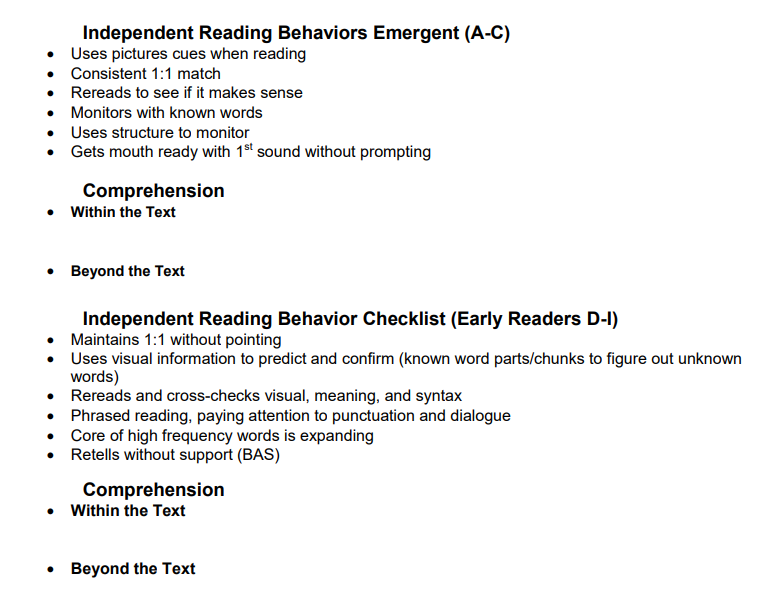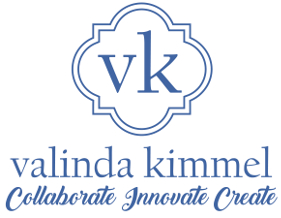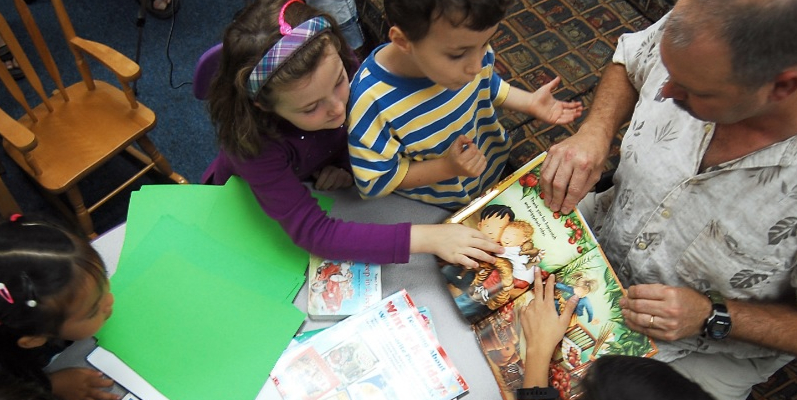Last week I visited a campus for a scheduled day-long session. I was early so the instructional coach and I chatted about her life outside school, books she’s currently reading, a recent training opportunity she’d had.
When I asked Evelyn how she felt about the day ahead of us, she shared where she felt the staff on her campus were in their process of implementing a new progress monitoring system for grades K-5. She was apologetic as she indicated she was unsure if they were on track.
“Talk to me about where you think the teachers are in using the data to inform their classroom instruction and their intervention planning.” I said.
She showed me notes on a document she’d made to guide the discussions for the first and second grade PLCs that had met in previous weeks.
Evelyn shared that she had created the document to reflect characteristics of Pre-A, Emergent, Early Readers and Transitional Readers so that teachers could quickly decide if their readers were showing signs of typical behaviors for readers in these stages. She indicated on the document where she had also made direct connections from the progress monitoring tool to her district’s report card assessments for students.
The final step on the reflection document was to ask them to reflect on what these teachers were learning about their readers as individuals, but also prompted them to think about emerging patterns they saw across the data collected from the whole class. All this so they could plan both whole class instruction and intervention plans for their small groups. The teachers in one grade level had noticed that their students were not using critical academic vocabulary e.g., setting, problem, events, resolution. When asked questions about the genre, kids weren’t able to articulate elements or characteristics of specific genres. The portion of the assessment that required kids to talk about author’s craft was also tricky for their students.
The teachers in one grade level had noticed that their students were not using critical academic vocabulary e.g., setting, problem, events, resolution. When asked questions about the genre, kids weren’t able to articulate elements or characteristics of specific genres. The portion of the assessment that required kids to talk about author’s craft was also tricky for their students.
The grade level team made plans to strengthen instruction and modeling targeting the gaps they’d noticed. They planned to check for students’ learning often and in ways that provided plenty of formative data so they’d be able to adjust their instruction to maximize learning.
I was so impressed by Evelyn’s thinking process as she planned for the PLC meetings. When we chatted further, Evelyn explained that she reads (a lot) of books and articles on the teaching of reading. Her list of books she shared are by well-known leaders in the field; Clay, Fountas, Pinnell, Pearson, and more.
Evelyn spoke of knowing her teachers needed this powerful work on literacy, but were overwhelmed with the daily work of teaching kids to read and find little time left over for searching out research. It was her plan to continue reading the experts, working to synthesize the research and then facilitating conversations with teachers when they met to talk about the needs of their students performing below grade level.
My conversation with Evelyn was incredibly instructive. I saw at once that she wanted teachers she supports to know the research and yet fully realizes that is an area where they need scaffolding, if you will. Instead of seeing that knowledge gap for teachers as a barrier, she approaches it in a way that allows her to distill the most important bits for teachers, share with them up-to-date research and provide support as they plan instruction.
Evelyn also laid out a plan for working collaboratively with teachers in designing their classroom environment and instructional framework so that it supports the optimal learning for readers. She is in the early stages of that support, but shared that teachers are seeing changes in their teaching and changes in student learning.
Top Tier Coaching moves Evelyn employs:
- viewing teachers’ instructional assets (no deficit model thinking here) and building on strengths
- working diligently to know the sound research base, synthesizing and designing support for teachers
- thinking intentionally and strategically through a workable (not overwhelming) plan of collaborating with teachers to implement theory into action
- drawing explicit connections to, between, across all the resources teachers are required to use
Evelyn is not unique in her ability to think and act strategically to facilitate change. There are many other instructional coaches who are working daily to collaborate with teachers and support staff to maximize learning for all readers. We do want to take notice of the coaching moves of Top Tier Instructional Coaches and learn from the best of the best.
Thank you, Evelyn. And to countless others for your work, your heart, your dedication.











YES! Top Tier Coaches do so much work behind the scenes. I love this, “We do want to take notice of the coaching moves of Top Tier Instructional Coaches and learn from the best of the best.” Everyone can continue to grow and learn. <3